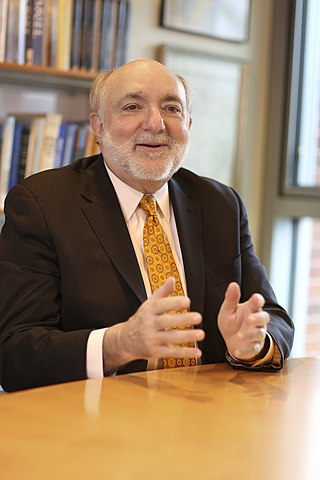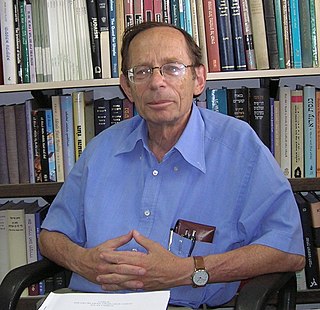Halakha, also transliterated as halacha, halakhah, and halocho, is the collective body of Jewish religious laws that are derived from the written and Oral Torah. Halakha is based on biblical commandments (mitzvot), subsequent Talmudic and rabbinic laws, and the customs and traditions which were compiled in the many books such as the Shulchan Aruch. Halakha is often translated as "Jewish law", although a more literal translation of it might be "the way to behave" or "the way of walking". The word is derived from the root which means "to behave". Halakha not only guides religious practices and beliefs, it also guides numerous aspects of day-to-day life.

The Jewish Theological Seminary (JTS) is a Conservative Jewish education organization in New York City, New York. It is one of the academic and spiritual centers of Conservative Judaism and a major center for academic scholarship in Jewish studies. The Jewish Theological Seminary Library is one of the most significant collections of Judaica in the world.
Elliot N. Dorff is an American Conservative rabbi. He is a Visiting Professor of Law at UCLA School of Law and Distinguished Professor of Jewish theology at the American Jewish University in California, author and a bio-ethicist.
Joel Roth is a prominent American rabbi in the Rabbinical Assembly, which is the rabbinical body of Conservative Judaism. He is a former member and chair of the assembly's Committee on Jewish Law and Standards (CJLS) which deals with questions of Jewish law and tradition, and serves as the Louis Finkelstein Professor of Talmud and Jewish Law at the Jewish Theological Seminary of America in New York City, where he formerly served as dean of the Rabbinical School. He is also Rosh Yeshiva of the Conservative Yeshiva in Jerusalem, Israel, an institution founded and maintained by the United Synagogue for Conservative Judaism and under the academic auspices of JTS. In 2006, Rabbi Roth took over as chair of the Hebrew Language department at JTS. Rabbi Roth is a well-known teacher of Hebrew grammar. He is a vociferous proponent of the existence of the "sheva merakhef".

Jewish ethics is the ethics of the Jewish religion or the Jewish people. A type of normative ethics, Jewish ethics may involve issues in Jewish law as well as non-legal issues, and may involve the convergence of Judaism and the Western philosophical tradition of ethics.

Bar-Ilan University is a public research university in the Tel Aviv District city of Ramat Gan, Israel. Established in 1955, Bar Ilan is Israel's second-largest academic institution. It has about 20,000 students and 1,350 faculty members.

David Novak, is a Jewish theologian, ethicist, and scholar of Jewish philosophy and law (Halakha). He is an ordained Conservative rabbi and holds the J. Richard and Dorothy Shiff Chair of Jewish Studies as Professor of the Study of Religion and Professor of Philosophy at the University of Toronto since 1997. His areas of interest are Jewish theology, Jewish ethics and biomedical ethics, political theory, and Jewish-Christian relations.

Menachem Elon was an Israeli jurist and Professor of Law specializing in Mishpat Ivri, an Orthodox rabbi, and a prolific author on traditional Jewish law (Halakha). He was the head of the Jewish Law Institute of the Hebrew University of Jerusalem.
Judah David Bleich is an authority on Jewish law and ethics, including Jewish medical ethics. He is a professor of Talmud at the Rabbi Isaac Elchanan Theological Seminary, an affiliate of Yeshiva University, as well as head of its postgraduate institute for the study of Talmudic jurisprudence and family law. At Yeshiva University, he holds the Herbert and Florence Tenzer Chair in Jewish Law and Ethics. He also teaches at Cardozo Law School. He is married to Dr. Judith Bleich, a historian of 19th-century European Jewry.

Daniel Sperber is a British-born Israeli academic and centrist orthodox rabbi. He is a professor of Talmud at Bar-Ilan University in Israel, and an expert in classical philology, history of Jewish customs, Jewish art history, Jewish education, and Talmudic studies.
Aaron L. Mackler is Associate Professor of Theology at Duquesne University in Pittsburgh, Pennsylvania and an ordained Conservative Rabbi. He is an author in the fields of bioethics and Jewish law. He was editor of Life and Death Responsibilities in Jewish Biomedical Ethics and authored Introduction to Jewish and Catholic Bioethics, part of the Georgetown Press Moral Traditions series.

David Ellenson is an American rabbi and academic who is known as a leader of the Reform movement in Judaism. Ellenson is currently director of the Schusterman Center for Israel Studies and visiting professor of Near Eastern and Judaic studies at Brandeis University and interim president of the Hebrew Union College-Jewish Institute of Religion (HUC-JIR). He previously served as president of HUC-JIR from 2001 to December 31, 2013, and is now chancellor emeritus of that college. Ellenson is currently serving as interim president following the death of his successor, Aaron D. Panken.
Michael Jay Broyde is a professor of law and the academic director of the Law and Religion Program at Emory University School of Law. He is also a senior fellow in the Center for the Study of Law and Religion at Emory University. His primary areas of interest are law and religion, Jewish law and Jewish ethics, and comparative religious law. Broyde has published 200 articles on various aspects of law and religion and Jewish law, and a number of articles in the area of federal courts.
Tehumin is a Hebrew-language annual journal of articles about Jewish law and Modernity.
Jewish medical ethics is a modern scholarly and clinical approach to medical ethics that draws upon Jewish thought and teachings. Pioneered by Rabbi Immanuel Jakobovits in the 1950s, Jewish medical ethics centers mainly around an applied ethics drawing upon traditional rabbinic law (halakhah). In addition, scholars have begun examining theoretical and methodological questions, while the field itself has been broadened to encompass bioethics and non-halakhic approaches.

Ono Academic College is a private college located in Kiryat Ono, Israel with over 18,000 students. With its vision of bridging economic and cultural gaps in Israeli society, the college attracts Druze, Bedouin, Palestinians, Ethiopian-Israelis, ultra-Orthodox Jews, and special needs students.
In Judaism, views on abortion draw primarily upon the legal and ethical teachings of the Hebrew Bible, the Talmud, the case-by-case decisions of responsa, and other rabbinic literature. While all major Jewish religious movements allow or encourage abortion in order to save the life of a pregnant woman, authorities differ on when and whether it is permitted in other cases.
Judaism has teachings and guidance for its adherents through the Hebrew Bible and rabbinic literature relating to the notion and concept of peace. The precepts of peacefulness and compassion are paramount in Judaism, Judaism also contains a number of doctrines which eschew violence. However, while Judaism condemns normative violence, it is not categorically pacifist.

Avraham Weinroth is the owner and founder of Avi Weinroth & Co. Law firm which specializes in litigation, real estate and commercial law. Weinroth was a senior partner for 25 years in the office of Jacob Weinroth and in 2013 established his own law firm. Weinroth lectured on property law, banking law and corporate law at Tel-Aviv University and Peres Academic Center in Rehovot. Weinroth is the author of 23 books and dozens of articles in the fields of law, thought and the Jewish view.

Gerald Blidstein was professor emeritus of Jewish Philosophy at Israel's Ben-Gurion University of the Negev. He was the Israel Prize laureate in Jewish philosophy (2006) and had been a member of the Israel Academy of Sciences since 2007.







